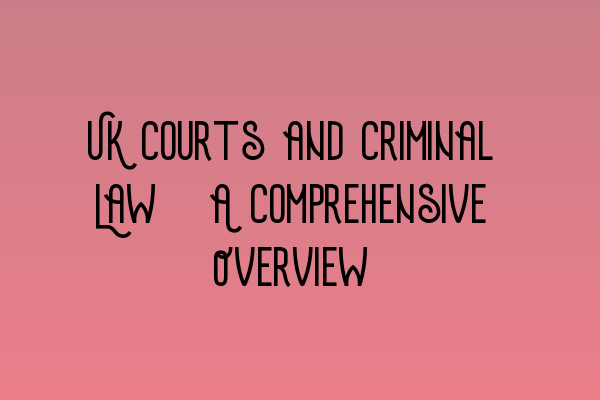UK Courts and Criminal Law: A Comprehensive Overview
Welcome to SQE Criminal Law & Practice Law UK! In this comprehensive overview, we will delve into the intricacies of the UK courts and criminal law system. Whether you are a law student, aspiring solicitor, or simply interested in understanding the legal landscape, this article will provide valuable insights into the topic.
The UK courts play a vital role in the criminal justice system, ensuring that justice is served and the rule of law is upheld. Understanding the structure and functions of these courts is essential for any legal practitioner. Let’s explore some key aspects.
The UK Courts System
The UK courts system is divided into two main categories: criminal courts and civil courts. Criminal courts handle cases involving criminal offenses, while civil courts deal with disputes between individuals or organizations.
Within the criminal courts, there are several levels of courts, each with specific jurisdictions and functions. These include the Magistrates’ Court, Crown Court, and higher courts such as the Court of Appeal and the Supreme Court.
Magistrates’ Court
The Magistrates’ Court is the entry point for most criminal cases in the UK. It primarily deals with less serious offenses, such as minor assaults, theft, and traffic violations. Magistrates, who are laypersons, preside over these cases. For more information on the Magistrates’ Court, check out our SQE 1 Practice Mocks FLK1 FLK2 article.
Crown Court
The Crown Court is where serious criminal cases are heard. These cases include murder, rape, and drug trafficking. A judge and jury preside over these trials, ensuring a fair and impartial decision. If you’re preparing for your SQE exams, our SQE 1 Practice Exam Questions article might be helpful.
Higher Courts
The Court of Appeal and the Supreme Court are the higher courts in the UK. The Court of Appeal reviews decisions made by lower courts, assessing their legality and fairness. The Supreme Court is the final court of appeal, dealing with significant legal matters affecting the entire country. To learn more about preparing for your SQE exams, visit our SQE 2 Preparation Courses and SQE 1 Preparation Courses articles.
Criminal Law in the UK
Criminal law encompasses the rules and regulations that define criminal offenses and their punishments. It sets out the procedures and principles that guide the investigation, prosecution, and trial of criminal cases. Understanding criminal law is crucial for any aspiring solicitor.
Key principles of criminal law in the UK include the presumption of innocence, the burden of proof on the prosecution, and the right to a fair trial. These principles aim to protect the rights of individuals accused of criminal offenses and ensure justice is served.
If you’re interested in pursuing a career in criminal law or learning more about the legal profession, it’s essential to stay up-to-date with current developments and exam dates. Our SRA SQE Exam Dates article provides the latest information on exam schedules and deadlines.
Conclusion
In conclusion, the UK courts and criminal law system are vital components of our society, ensuring fairness, justice, and the rule of law. Understanding the structure, functions, and principles of these institutions is crucial for anyone interested in practicing criminal law. Remember to explore our related articles for more in-depth information on SQE exam preparation and important dates.
Thank you for reading this comprehensive overview by SQE Criminal Law & Practice Law UK. If you have any further questions or need legal assistance, don’t hesitate to contact us.
